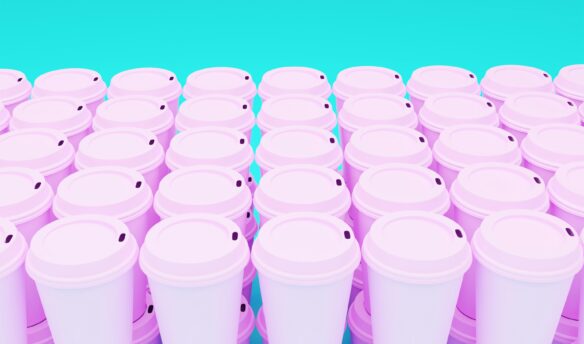Topsy-turvy coffee predictions from Brazil, a survey to promote wage transparency, and Starbucks continues closing unionized stores.
Here’s a roundup of this week’s biggest coffee headlines.
‘Brazil Farmers, Agronomists Downgrade 2023 Coffee Crop Expectations’ – via Reuters
Coffee yield predictions in Brazil have been all over the place. After better-than-expected rainfall this season, farmers and experts predicted an increase in coffee production. Traders and analysts foretold an eight or even ten percent rise in output from the world’s largest coffee producer; the New York arabica futures market took note, and the C price plummeted.
The C market has now recovered slightly as Brazilian producers and researchers scale back expectations for next year’s crop. Reports have come in of unsatisfactory fruit production after the rain-induced flowering, with experts worried that less fruit on stressed trees could lead to lower yields.
“We were expecting an increase in yields (for 2023), but we changed ideas after the flowering development,” producer Paulo Armelin told Reuters. Armelin hypothesized the previous dry winter in Brazil could be to blame, saying that many trees weren’t healthy enough to convert enough flowers to fruit.
Cooxupe, the country’s largest coffee co-op, said that next year’s harvest will be similar in size to the previous two years, which were both impacted by poor weather. The US Department of Agriculture also cut its projection for Brazil’s 2023 arabica harvest.
These reports add more uncertainty to a global coffee industry still based on the ever-volatile and unpredictable C price, where the whims of traders and analysts affect more than just coffee prices—their judgments can directly impact the livelihoods of millions of farmers.
‘Take The Coffee Wage Survey With GoFundBean’ – via Fresh Cup Magazine
Are you a US-based coffee worker? You can help Go Fund Bean explore the state of wages in the coffee industry by filling out their survey before December 31.
In 2019, wage transparency was a hot topic among baristas— numerous crowd-sourced spreadsheets circulated in different cities across the country showing significant discrepancies in pay among workers in similar jobs. Now Go Fund Bean is looking to revitalize the conversation and see if anything has changed in the years since.
“The movement toward greater transparency on the service side of the coffee industry in 2019 was an important one that got somewhat interrupted by COVID,” Go Fund Bean said in a press release. “We want to encourage this conversation again. Without clear data about where the industry stands currently, we can’t move forward together.”
Go Fund Bean started as a website collating virtual tip jars for baristas during the first months of the pandemic and has since grown into a non-profit that supports hourly coffee workers with grants, mental health programs, professional development initiatives, and lots more.
Once gathered, Go Fund Bean plans to use the data in a few ways, including comparing findings with wage surveys from 2019 and the MIT Living Wage calculator. Open to hourly and salaried workers, Go Fund Bean hopes the survey will be relevant to all industry sectors.
Read the full story here and take the survey here.
More News
‘Former Russian Krispy Kreme Franchisee Launches’ Krunchy Dream” – via World Coffee Portal
‘La Colombe and Molson Coors Prematurely Ending Distribution Deal’ – via Daily Coffee News
‘Labor Federation Asks SEC to Examine Starbucks’ Gift Card Breakage Rate’ – via Restaurant Dive
‘Luckin Coffee Continues Rapid Outlet Expansion Across China’ – via World Coffee Portal
‘Starbucks Opens Three-Story Store Inside Empire State Building’ – via Daily Coffee News
The Week in Coffee Unionizing
Lots of news this week, and this time it’s not just Starbucks-related:
- Workers at a Blank Street Coffee location in New York have filed to unionize, the first such push at the fast-growing, venture-capital-backed chain. The filing covers 35 employees at a cafe in West Brooklyn, who are being represented by their local chapter of the United Food and Commercial Workers (UFCW) union.
- A second La Colombe location has filed to unionize in Washington, DC, in the space of a week. Both the Farragut and Chinatown stores are represented by the UFCW and have called on the company to voluntarily recognize the union after a majority of employees signed union cards.
- Workers at two Ultimo Coffee locations in Philadelphia have voted to form a union, bringing all four of the company’s stores under the umbrella of the Philadelphia Joint Board, Workers United Local 80. Local 80 is a new union set up expressly to organize Philadelphia’s coffee shops and bakeries, with Ultimo joining newly unionized ReAnimator Coffee, Korshak Bagels, Good Karma Cafe, and Elixr Coffee Roasters.
- The Starbucks union drive within Canada is gaining momentum. Right now, there are six unionized Starbucks locations across British Columbia and Alberta—and more are on the way. A cafe in Victoria, BC, remains the only store in North America with a ratified contract, and organizers say ratifying more contracts remains challenging as the company fights back.
- Starbucks is closing a Seattle store that was the first to unionize in the company’s hometown, making it the fourth unionized location in Seattle to be shuttered. The reason given is, once again, “safety concerns,” while the union calls it “the most clear-cut case of retaliation this company has shown closing a union store yet.”
The Week in Corporate Coffeewashing
Nespresso is launching a home-compostable coffee pod. The company says the move is in response to customer demand for compostable packaging. Nespresso also cites its recent B Corp certification as inspiration for the new pod.
“Since becoming a B Corp earlier this year, we’re more committed than ever to widening the sustainable choices we offer our consumers,” said Nespresso CEO Guillaume Le Cunff. Nespresso received B Corp certification in May 2022, and there was quite a backlash from fair trade groups and other coffee companies.
The new pods will “complement our offering of aluminum capsules that are both recyclable and made using 80% recycled aluminum,” Le Cunff continued. This is the part of the newsletter where we—again—point out that just 5% of Nespresso pods ever get recycled.
The paper-based compostable pods will be trialed in France and Switzerland next spring before being launched “in several other European countries within a year.” Will these eco pods be anything more than a good PR move in the 14 billion pod-per-year market? We’ll have to wait and see.
Is Coffee Good For You?
Mixed news this week, with two studies coming to slightly different conclusions.
On the one hand, a new study in the American Journal of Clinical Nutrition found that drinking coffee was associated with a lower risk of type 2 diabetes (T2D) in people with a history of gestational diabetes mellitus (GDM). GDM is a form of diabetes first diagnosed during pregnancy, and aside from possible adverse pregnancy and birth outcomes, those who suffer from it are also at higher risk for T2D later in life.
This study followed 4,522 participants for over 20 years and found that habitual coffee consumption was associated with a lower risk of developing T2D. The study appears to point to caffeine as the main reason, but as noted in a journal editorial, the researchers didn’t investigate tea consumption, which could have shined more light on caffeine’s impact on T2D in countries where tea is the primary caffeine source.
Meanwhile, researchers in Spain found that coffee might not have as many anti-inflammatory properties as previously thought.
Published in the journal Nutrients, the study looked at plasma concentrations of pro-inflammatory and anti-inflammatory markers in 244 participants, cross-referencing their height, weight, and body composition with self-reported data about coffee consumption, diet, and activity levels.
The results found a link between “low caffeine intake” and slightly lower levels of C-reactive protein (CRP), a pro-inflammation marker, meaning that “regular caffeine consumption induced very limited anti-inflammatory effects.”
Beyond the Headlines
‘In Naples, Reviving The Lost Coffee Brewing Method Of “La Cuccuma”’ by Molly Fitzpatrick
‘Coffee Production in Guinea’ by Peter Gakuo
‘Brewing A New Narrative For Vietnamese Coffee In America’ by Jenn Chen
‘How Istanbul’s Ancient Coffee Culture is Holding Its Own in the Modern World’ by Connor McGovern
Coffee News Club is written by Fionn Pooler and the Fresh Cup editorial team.






